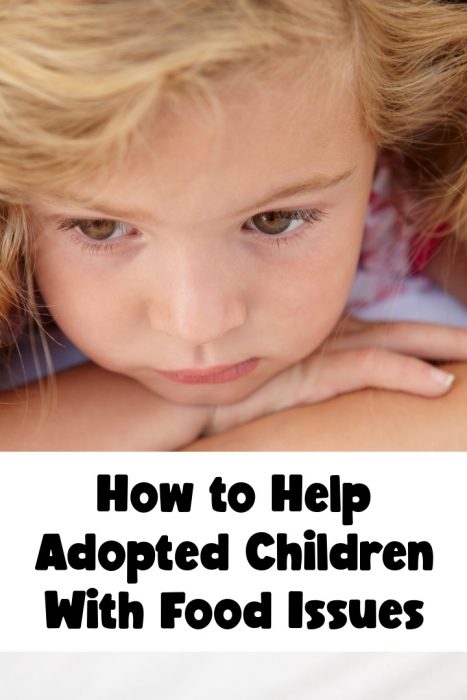Is your adopted child having issues with food? Learn how to help adopted children with food issues with these tips below.

Food issues may be one of the most frustrating challenges experienced by adoptive parents, especially for those families who have adopted internationally. What makes food issues so complex is the spectrum of challenges that adopted kids display, from not being able to use cutlery properly to underlying emotional issues.
How to Help Adopted Kids Answer Adoption Questions
How to Help Adopted Kids Deal with Separation Anxiety
Sleep Issues with Adopted Kids
The most common eating issues among adopted kids are hiding food for future consumption, gorging on too much food at one sitting, refusal to eat and being extremely picky about food choices.
To help a child manage these food issues, adoptive parents need to understand why their child has these issues, develop strategies for addressing the eating disorder and know where to go for help and support.
How to Help Adopted Children With Food Issues
Reasons Adopted Kids Have Eating and Food Issues
Each adopted child has a unique life experience that affects thoughts, emotions and behavior. Often their life experience has taught them that life is unpredictable and most of the time, out of their control. When placed in a permanent adoptive home, many adoptees do not trust the security of their new life and therefore behave in ways that can puzzle new adoptive parents.
Food issues tend to be one of the first challenges that adoptive families must address. Some of the reasons adopted children present with food challenges and eating disorders are because they:
- Are seeking control over their environment due to an unpredictable life before adoption.
- Suffer malnourishment from overeating unhealthy foods or overall lack of nutritious foods.
- Have undiagnosed allergies and sensitivities such as lactose intolerance.
- Are struggling with cultural and dietary differences such as new foods and expectations at mealtimes.
- Have physical and medical conditions that prevent proper eating.
Adoptive parents can look at what is known of the child’s case history to help determine possible reasons for the child’s food issues. If the problem is not apparent, it is advisable to take the child to a medical professional specializing in eating disorders of adopted kids.
Strategies for Helping Adopted Children Eat Properly
Adoptive parents need to look at the food issues their child struggles with as an opportunity to help build positive attachments. It is not uncommon for a child with food issues to also have attachment issues, so in some cases the best strategy is to start by meeting the child’s basic need for food, much like parents do for infants.
Depending on the age of the child, the following strategies are also effective.
- Keeping a cupboard or container of snacks accessible to the child at all times.
- Preparing meals they are used to until they are settled into the adoptive home.
- Experimenting with textures and presentation, such as pureeing food or making food easy for the child to eat with fingers.
- Being flexible about table manners while demonstrating pleasant meals the whole family participates in.
- Avoid having battles over food by setting realistic expectations for the child.
If the child is refusing to eat, allow the adoptee to practice chewing and swallowing skills by encouraging him to experiment with a clean toothbrush and praise him for any small development in his eating habits. Older children may also respond to role-playing kitchen and eating experiences as a game to help reinforce what they are learning at mealtimes.
Getting Help for Adoptees with Eating Disorders
There are many professionals who can assist adoptive families as they navigate the complex food issues that affect their child. As the child’s mental, emotional, developmental or physical health can manifest through a myriad of eating disorders, it is suggested to consult with a variety of practitioners, including:
- Medical doctor
- Child development specialist
- Nutritionist
- Naturopathic doctor
- Occupational therapist
- Adoption social worker
- Psychiatrist
It is also advisable to seek support from other families experiencing the same challenges and work with adoption specialists such as Adoption Learning Partners which offers webinars on the topic.
Ideally, the food experts an adoptive family consults has experience working with adopted children and is able to provide ongoing support to not just the child, but also the adoptive parents.
When food issues are viewed as a symptom of a bigger obstacle being experience by an adopted child, adoptive parents are better able to tap into resources that will be effective in the long-term.
Albeit challenging, food issues can be managed in a positive way by approaching the problem as an opportunity to strengthen the parent-child bond.
Leave a Reply